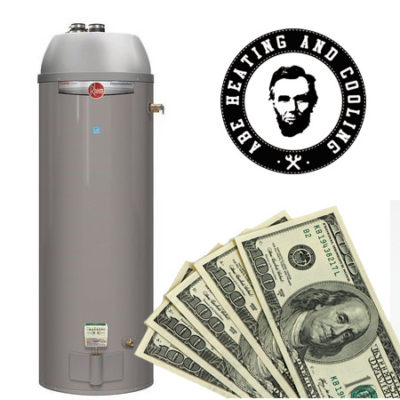“Abe's Heating and cooling were professional and on time. they helped me with two time sensitive projects and did excellent work. I know who I'll be calling if I should ever need an HVAC technician.”
Blog
 According to the U.S. Department of Energy, water heaters account for about 18 percent of the average household’s annual energy costs. This presents opportunities for significant savings, if you’re ready to get serious about reducing your hot water usage rates.
According to the U.S. Department of Energy, water heaters account for about 18 percent of the average household’s annual energy costs. This presents opportunities for significant savings, if you’re ready to get serious about reducing your hot water usage rates.
Studies show that a 10-degree decrease in temperature can cut your water heating costs by 3-5 percent.
These lower costs might not impress you if your comfort was truly at stake. But you can easily stay warm in the shower at 120 degrees. Try it and you’ll see.
A steadily leaking faucet can waste hundreds if not thousands of gallons of water each year, depending on the rate of leakage. Repairing leaky faucets is a routine affair for most people, although you may need to purchase replacement parts and find a good video online that will show you how to do it.
If you have one or more hot water faucets that leak, it can boost your water and electricity bills by a couple of dollars a month, at a minimum.
State-of-the-art showerheads use about 50 percent less water than their older counterparts. If you have a showerhead that is more than a decade old, you should replace it with a high-efficiency low-flow model. There will be no compromise on comfort, since these nifty items are engineered to produce satisfying showers time after time.
Sediment will inevitably settle in the bottom of your tank. If you don’t act to correct the problem, it could stress your water heater to the breaking point. Excessive sediment will force a water heater to work harder to reach its designated temperature setting, increasing power usage and boosting your utility bills in the process.
To ensure smooth and efficient operation, water heater tanks should be drained every 4-6 months. There are ‘how-to’ videos available that can show you how to do this. But if you aren’t comfortable performing this procedure, you should let the experts (like those from ABE Heating and Cooling, for example) handle it.
You should insulate at least the first three feet of pipe that exits the water heater. This can prevent significant heat loss whenever a hot water faucet is turned on anywhere in the house.
If you have a gas water heater, be sure to keep the insulation at least six inches clear of the flue.
Check your water heater owner’s manual. If the built-in insulation carries a rating of less than R-24, you’ll need to add an insulation blanket to your tank. Should you be unable to locate your owner’s manual, simply feel the tank on the outside. If it’s warm to the touch it means you have less insulation than you need.
If you don’t know how to install an insulation blanket, you can visit the Department of Energy website for detailed instructions.
Newer water heaters come with heat traps already installed, on the cold-water inlet and hot water outlet pipes. But if your appliance lacks them, you can purchase and add them yourself (it’s a simple job). These cheap valves prevent heat from leaking up the pipes when the water heater isn’t in use.
The Department of Energy estimates that you can save $20-$30 per year if you use heat traps. That’s enough savings to offset the cost of the traps in less than a year.
Water heater timers are a terrific item that can be purchased from hardware stores, home improvement stores or various online retailers. Installation is easy, and you can program them to shut off the water heater when you are away, sleeping or have no plans to use hot water in the next few hours.
A water heater timer absolutely will save you money, once you learn how use it.
If your existing water heater is more than a decade old, you’d be wise to consider upgrading to a new appliance that carries the ENERGY STAR ® certification of supreme energy-efficiency. Tankless water heaters and solar water heaters are often cheaper to operate than tanked water heaters, which is why you should investigate all your options before making a final decision.
For great advice about water heaters and how to save money on your utility bills, contact ABE Heating and Cooling today. We are located in Brighton, Colorado and serve the entire Denver Metro Area, and we are available to help you with all your water heater-related needs. As a licensed dealer for Ruud, the most esteemed brand name in the business, we can help you find a high-quality tanked or tankless water heater that will cut your energy bills dramatically, while giving you reliable service year after year.